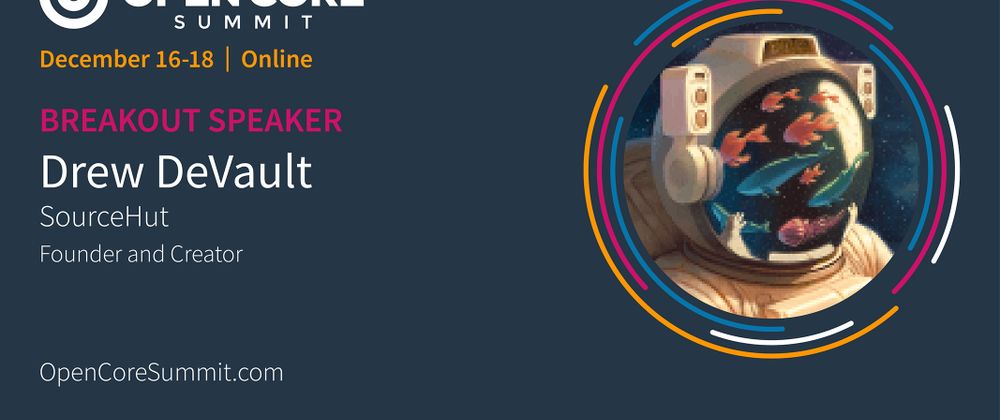Drew DeVault is the founder and creator of SourceHut.
Relevant Links
https://sr.ht/~sircmpwn/, https://sourcehut.org/
OCS 2020 Fireside Chat with Drew DeVault - Founder and Creator of SourceHut
JJ introduces the talk and topics that will be covered - 0:00
What’s your background? How did you get into computers, programming, and how did you learn about free software/open source? - 1:00
JJ, in response: Why do you believe that proprietary software doesn’t treat users with the same respect as open source? - 2:05
How much of a factor is skill/ability to take advantage of all those freedoms and flexibilities that you mentioned? Do you think the average person without any programming skills should be as convinced that they get all those respectfulness properties as someone who is a programmer? - 2:51
Over the last 20 years, open source has grown tremendously. We’ve seen so many iterations of how to store code, interact with it, collaborate on it. Beyond SourceForge, we’ve had GitHub and Atlassian with BitBucket and GitLab, all to share insights and code in public basically. You created SourceHut which is playing in this ecosystem. Explain the motivations for creating SourceHut, what is SourceHut, and in addition to that, explain your thoughts on version control social networks (like GitHub and SourceForge) over the last 20 years and how they’ve evolved. - 4:19
I want to dig into the architectural distinction between GitHub’s pull request model as compared to how the Git version control software is actually used in the Linux kernel community, where the method for collaborating and sharing is email as opposed to a centralized network like GitHub. You have a decentralizing effect when your communication protocol is email. Is that roughly correct? - 11:42
Linux is the largest, most impactful open-source technology in the world. Linux has stayed with this decentralized collaboration protocol based on email, but it seems that every other open-source project has defaulted to GitHub. Why do you think that is? Why have the hundreds of millions of open-source projects defaulted to these newer networks over what Linux still uses today? - 15:20
I think you said a lot of important things there, and I want to dig into one, about “dopamine dispensers.” Can you unpack that more? It strikes me that almost everything on the Internet today has a massive layering of dopamine dispenser features. It’s everything we touch on the Internet really. How did you come to learn/develop strong opinions about these dopamine dispenser features? - 19:10
Would it be fair to say that technology solutions for humans on the Internet (e.g. social networks, eCommerce, programming environments, devtools) that are devoid of dopamine dispensers that are most aligning their interests with the users’ interests? (See: https://www.craigslist.org/) - 26:13
When did you initially build SourceHut? How has the progress been in terms of users? What do you pay attention to? - 28:44
How do you become a SourceHut user, what’s the workflow, and what is the architecture of SourceHut overall? - 30:50
So you can just use SourceHut as a decentralized communication layer for collaborating with projects that could even be on GitHub? How far could that go? - 32:45
To what degree is a hosted service/SaaS a good or bad thing? Or is it? Is that part of your design philosophy in terms of disaggregating git repos, and not requiring users to host repos with you? - 33:25
This is a great segway into your views on open core. What are your views on open core? Start with your definition of open core, what it means to you. - 36:12
Drew: What are some of the most important nuances I left out in my definition? - 37:45
(Drew elaborates on his observations/issues with open core. See: https://commonsclause.com/, https://gitlab.freedesktop.org/mesa) - 45:15
Focusing on the relationship between the project and the community. (JJ highlights CLAs and source-available licenses, elaborating on both points. JJ elaborates on definition of open source and role of discrimination.) - 49:54
(Drew elaborates on his perspective of open core, and how it implicitly couples the proliferation of non-open proprietary software with the growth of the open core. JJ responds and elaborates with a long-term example of technology shifting to open core with an ever-thinning crust, until the open core gives way to more full open source.) - 56:22
(Drew responds to JJ’s long-term view on open core’s crust gradually thinning, speaking about the role of federation. See: https://joinmastodon.org/) - 1:06:48
(JJ responds) - 1:10:05
Share your questions and comments below!



Top comments (0)